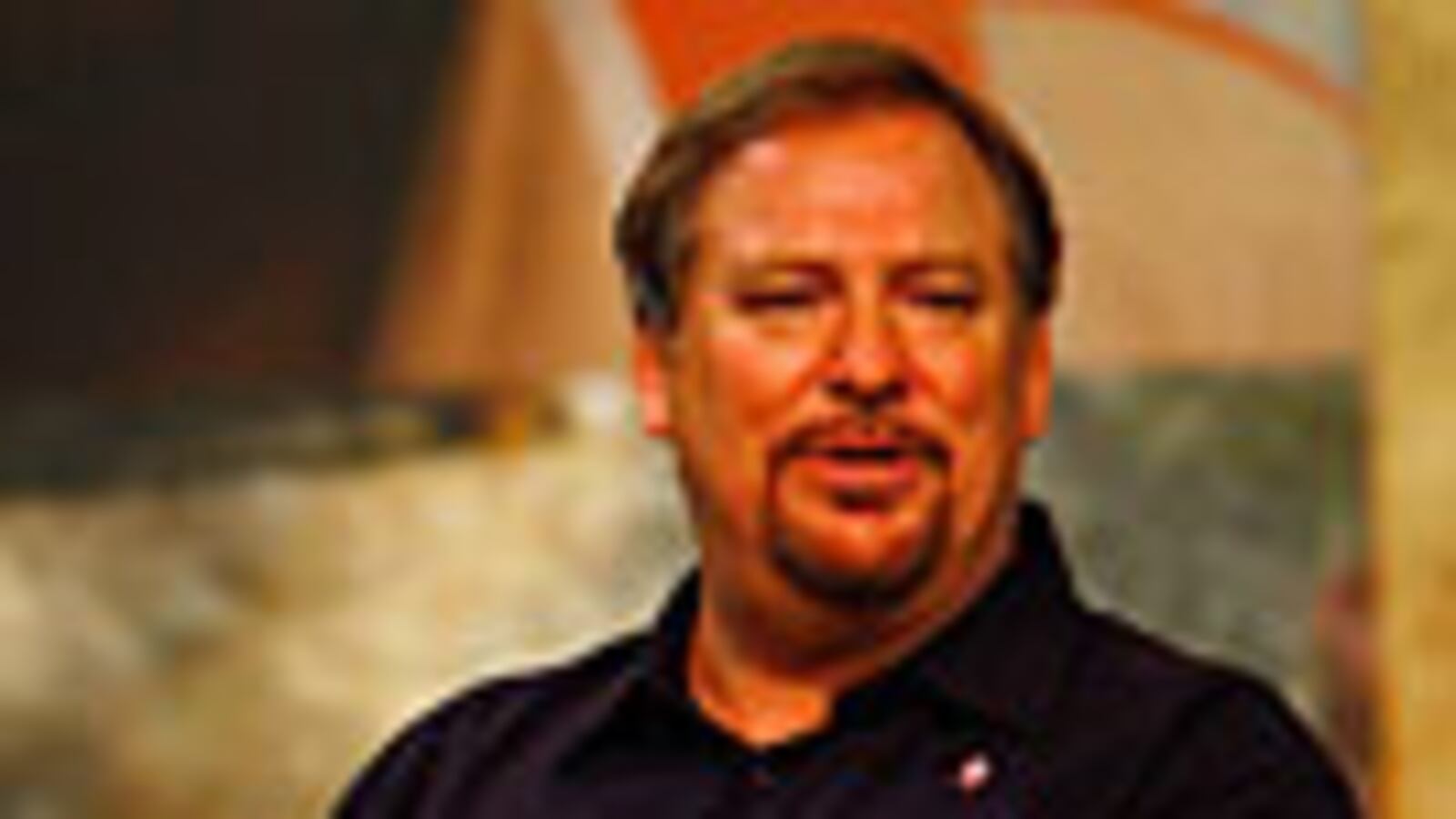
Here is how evangelical superstar Pastor Rick Warren, who will deliver the invocation at Barack Obama's inauguration, described his philosophy this August: “I have never been considered a part of the religious right, because I don't believe politics is the most effective way to change the world.”
The mainstream press has been almost universally eager to indulge his self-description. Nicholas Kristof, the New York Times columnist, called Warren “an evangelical liberals can love.” Newsweek named Warren one of fifteen “people who make America great.” And even The Nation published an article puffing Warren as “America’s Pastor,” a figure who “disassociates himself from the religious right, noting that he shares its position on social issues but doesn't want to focus on them. He focuses on poverty, disease and aid to Africa.”
Even the public relations firms responsible for burnishing Warren’s image seem mystified by the press’s worshipful portrayal of their client.
At age 54, Warren cuts a drastically different figure than the hard-right dinosaurs that defined the evangelical movement’s image. The mega-best-selling author of “The Purpose Driven Life,” Warren prefers jeans and short-sleeved shirts, often with loud, Hawaiian patterns, to the cheap suits familiar to Southern Baptist firebrands. He has a pudgy face and a paunch that gives him a teddy bear-like quality. When Warren preaches, he does so in a measured, almost ponderous tone, without hectoring or hollering.
Warren’s acknowledgment of climate change, his reputation for open mindedness and his calm manner enabled him to draw both Obama and John McCain in August to his Saddleback Civil Forum on the Presidency, where he sequentially questioned the candidates on their faith. Warren’s stature was never higher than on that day. He was ascendant as the 21st century version of Billy Graham, pastor to presidents, minister of the national soul, but moving away from the hard right.
But his tolerant image is belied by what he says on Sunday.
A week before Election Day, here is what “America’s Pastor” told the 22,000 members of his Saddleback Church in Orange County: “Here’s an interesting thing: there are about 2% of Americans [who] are homosexual, gay, lesbian people. We should not let two percent of the population determine—to change a definition of marriage that has been supported by every single culture and every single religion for 5,000 years. This is not even just a Christian issue, it is a humanitarian and human issue, that God created marriage for the purpose of family, love and procreation. I urge you to support Proposition 8 and to pass that on.”
Warren has also supported every major ballot measure opposing gay marriage that sprouted up in his native California in the past ten years, a fact that is barely mentioned in accounts of him as the pioneer of a “New Evangelical” movement that sees beyond the old hobgoblins of the far right. Warren waged a sub rosa campaign to re-elect George W. Bush, but was still described as never having been ”written or talked about…in the context of any political issue,” according to the non-partisan Religion News Service. Fighting the culture war with a velvet glove, Warren has constructed an international platform using two powerful constituencies few figures before him have been able to reconcile: conservative evangelicals hungry for more sophisticated leadership and opinion elites frantically searching for post-partisan heroes.
Warren’s unifying appeal eroded slightly when thousands of protesters appeared at the gates of Saddleback Church on November 9 to demonstrate against his support of California’s gay marriage ban. “I need some reassurance that I’m welcome here as a gay American,” said Sally Landers, a Saddleback member who joined the protesters outside her church. So far, Warren has not responded to the protest, and is likely to let the controversy blow over.
A representative from the Larry Ross Communications, the premier PR firm of the Christian right, seemed caught off guard when I called for a comment about the demonstrations. “When the protests happened they [Saddleback] were focused on services,” Warren spokesperson Kristin Cole told me, “so we haven’t done any public comments or anything like that.”
In the past, Warren’s crusading against gay rights was generally ignored. When Warren shepherded his congregants to the polls in 2000 to vote for Prop 22, a California ballot measure banning same-sex marriages (later overturned by the state Supreme Court), he hardly caused a stir outside evangelical circles. One of the few records of Warren’s support for the measure is a letter of gratitude the Christian right godfather James Dobson sent him. (To see the letter, click here and scroll below Dobson’s “Picture Of The Decade,” a blood-drenched fetus).
While Dobson and his allies lent early support to Bush’s 2004 reelection bid, Warren seemed to keep clear from the campaign. In the last days of the presidential race, however, Warren sent an urgent blast email to hundreds of thousands of evangelicals insisting they base their votes on five “non-negotiable” issues: abortion, stem cell research, gay marriage, human cloning, and euthanasia.
Having helped put Bush back in the White House, Warren returned to his more familiar role as a global altruist. “I've never been involved in partisan politics—and don't intend to do so now,” Warren insisted in an open letter urging the President to battle world poverty. In April 2005, Warren introduced members of his church and its 40,000 global affiliates to five new, but not necessarily non-negotiable issues, from AIDS to illiteracy. The pastor’s renewed focus on poverty helped earn him a spot in the ONE Campaign’s national ad blitz alongside Brad Pitt, P. Diddy, and other prominent faces of the glitterati. By the end of 2005, Warren’s culture war crusading was all but forgotten. “Many believe he is the successor to [Billy] Graham for the role of America’s minister,” Time proclaimed in naming him the country’s most influential evangelical.
By the start of the 2008 presidential race, Warren was a household name with unparalleled credibility. Unsurprisingly, both the McCain and Obama campaigns leapt at the opportunity to appear at “The Saddleback Civic Forum on the President,” a nationally televised q&a session on August 17 with Warren as moderator. “I'm not going to play 'gotcha' with one candidate and not with the other,” Warren promised beforehand. “This way, it will be totally fair.”
But the forum proved more nettlesome for Obama than Warren’s pitch suggested. In front of his audience of conservative evangelicals, Warren asked Obama: “At what point does a baby get human rights, in your view?” Knowing that answering the question directly would only further alienate most evangelicals from him, Obama replied haltingly, “Answering that question with specificity, you know, is above my pay grade.” The following day, right-wing radio hosts fulminated about Obama’s answer. James Dobson, who had once vowed to never vote for McCain, cited it as a reason for his endorsement of the Arizona senator. For his part, Warren chuckled at Obama’s response during an appearance on a conservative radio show.
Warren might have gamed the media somewhat, but he has never lied to reporters about his core beliefs. He freely admitted to a Wall Street Journal reporter that the principal difference between him and Dobson is “a matter of tone.” Even the public relations firms responsible for burnishing Warren’s image seem mystified by the press’s worshipful portrayal of their client. “[Rick Warren’s] support of Prop 8 is consistent with the statement of belief that his church stands on, which is a biblical belief,” Cole of A. Larry Ross Communications told me. “As far as being America’s pastor or whatever, well, that’s just a title the media has given him.”
Max Blumenthal is a senior writer for The Daily Beast and writing fellow at The Nation Institute, whose book, "Republican Gomorrah" (Basic/Nation Books), is forthcoming in Spring 2009. Contact him at maxblumenthal3000@yahoo.com.






